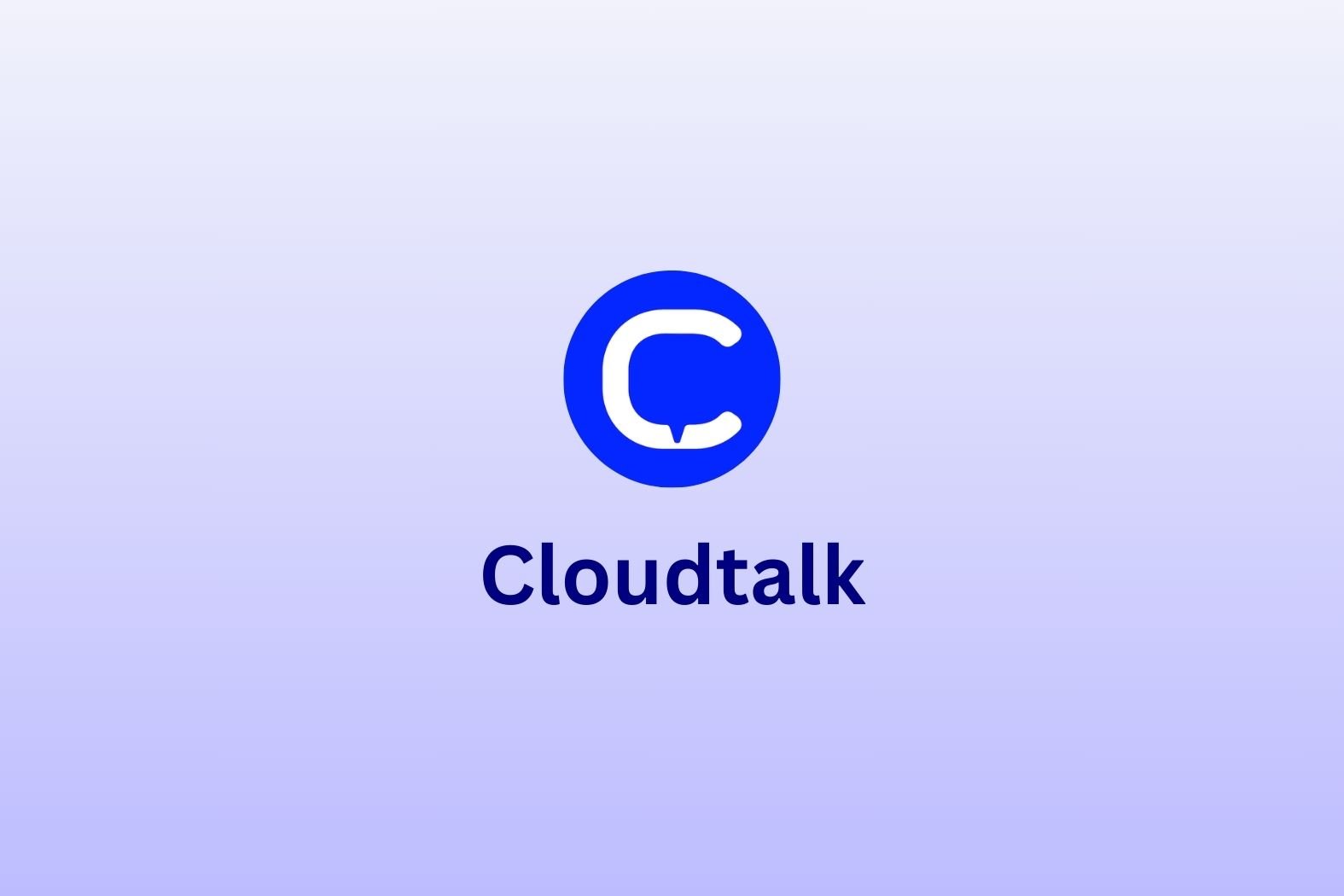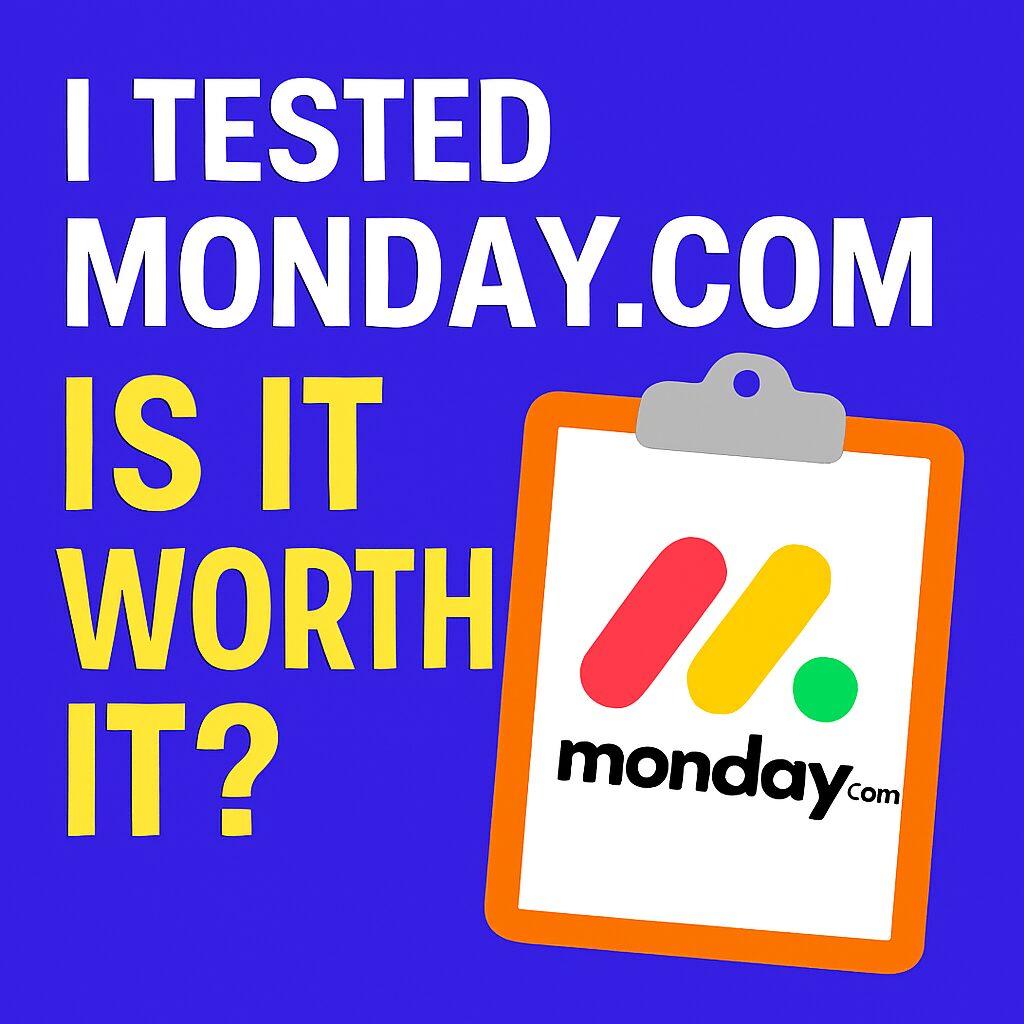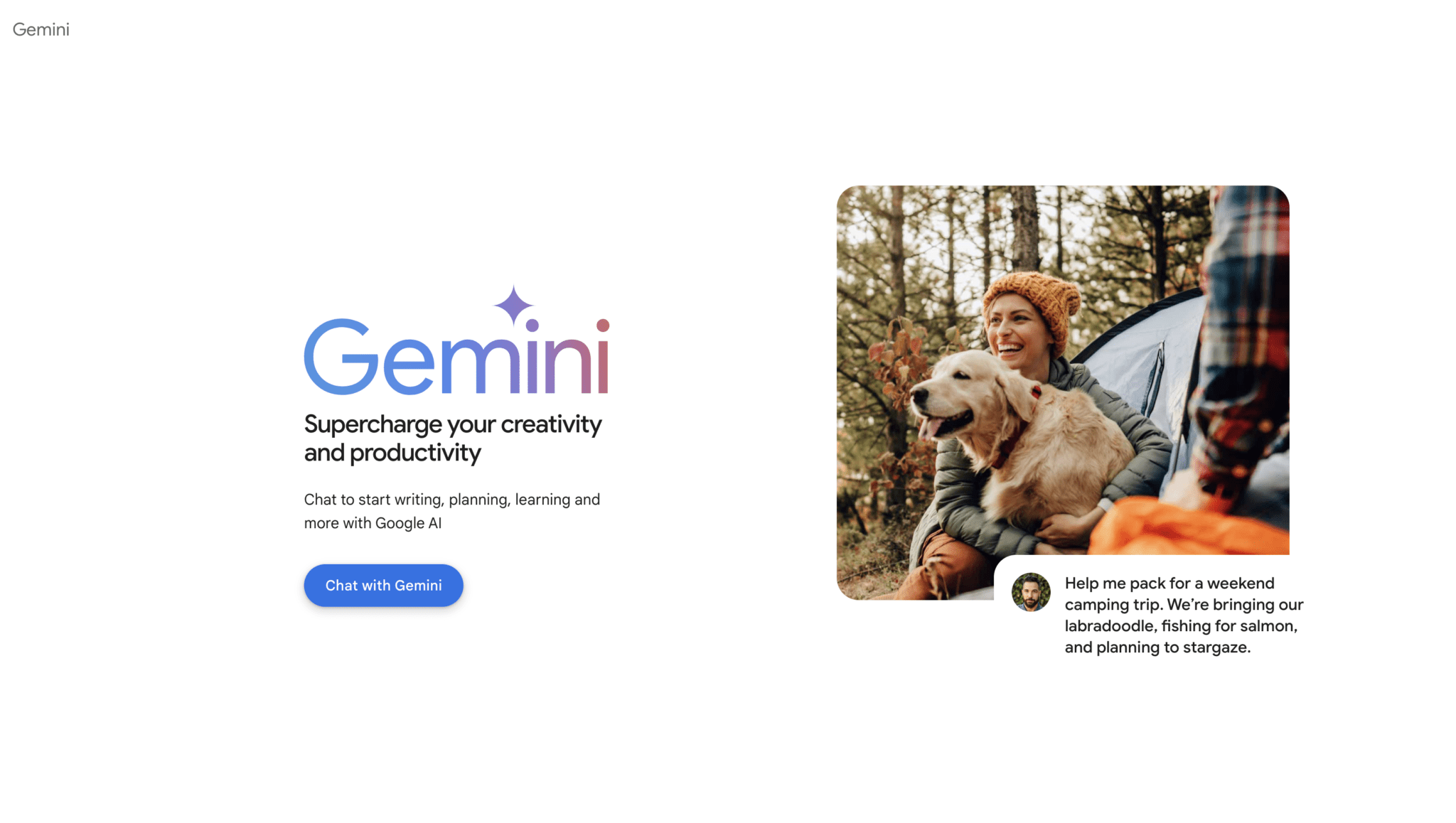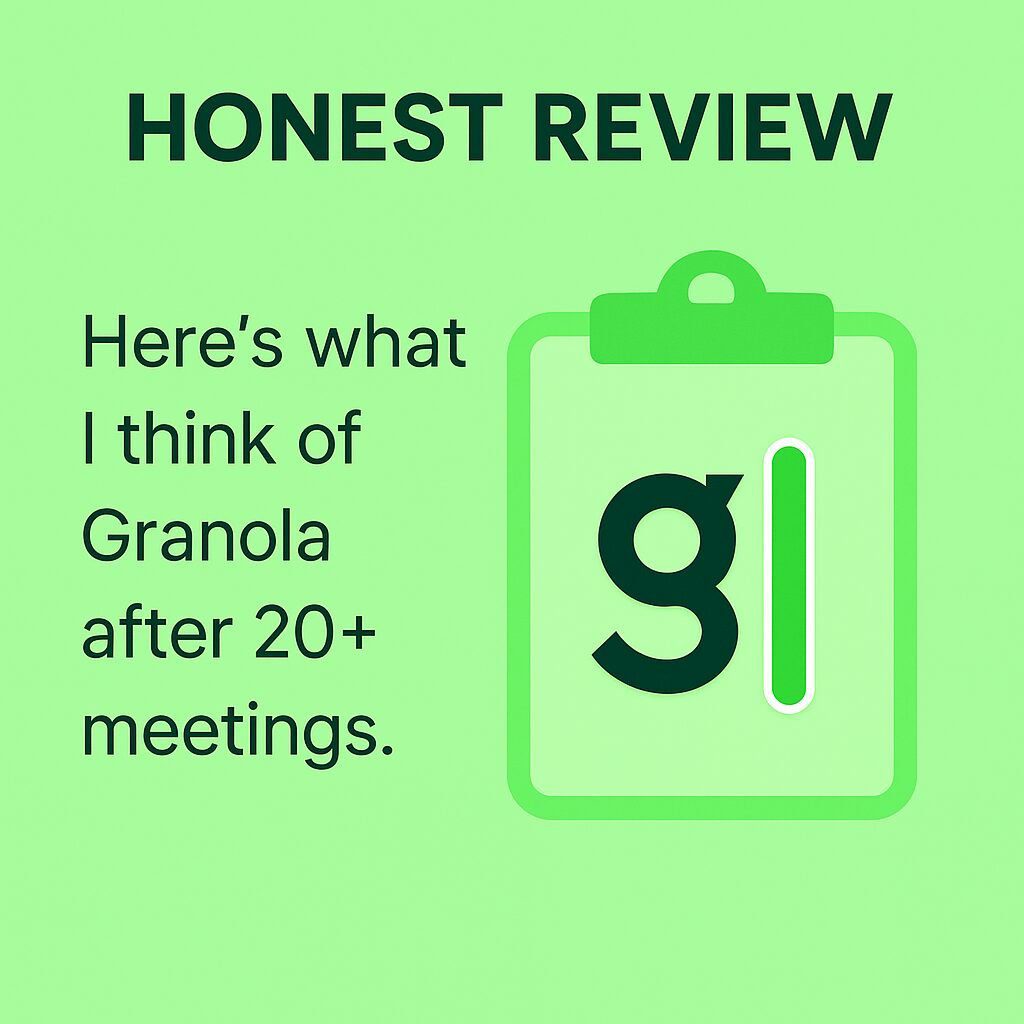If you’re on the hunt for the best Cloudtalk alternatives, you’re not alone. While Cloudtalk has made a name for itself in the VoIP and contact center space, many teams are exploring tools with more tailored features, better integrations, or more flexible pricing. Whether you’re scaling a sales team, managing remote support, or simply need smarter communication tools, there’s no shortage of powerful options to consider in 2025.
From AI-powered meeting assistants to all-in-one business communication platforms, the market has evolved with solutions that go far beyond voice calls. Tools like tl;dv, Dialpad, and Apollo now offer deeper analytics, better user experiences, and top-tier integrations with the platforms your team already uses—making them strong contenders depending on your workflow and goals.
In this guide, we’ve rounded up the top 5 Cloudtalk alternatives that combine voice, video, SMS, AI, and automation to help your team work smarter. Let’s dive in.
TL;DR – The Best CloudTalk Alternatives
Pressed for time? Here’s a quick snapshot of the top CloudTalk competitors and what they do best:
- tl;dv: Best for AI meeting recording, summaries, and powerful automations (Best Free plan. Paid from $18/user/month).
- Dialpad: Best for unified communications with AI
- (Free plan. Paid from $23/user/month).
- Aircall: Best for call center and sales teams (No Free plan. Paid from $30/user/month).
- JustCall: Best for global numbers & SMS automation (No Free plan. Paid from $19/user/month).
- RingCentral: Best for all-in-one business communication (Free plan. Paid from $20/user/month).
Want the details? We’ll break down what makes each of these tools a strong CloudTalk alternative, but first, what even is Cloudtalk?
What is Cloudtalk?
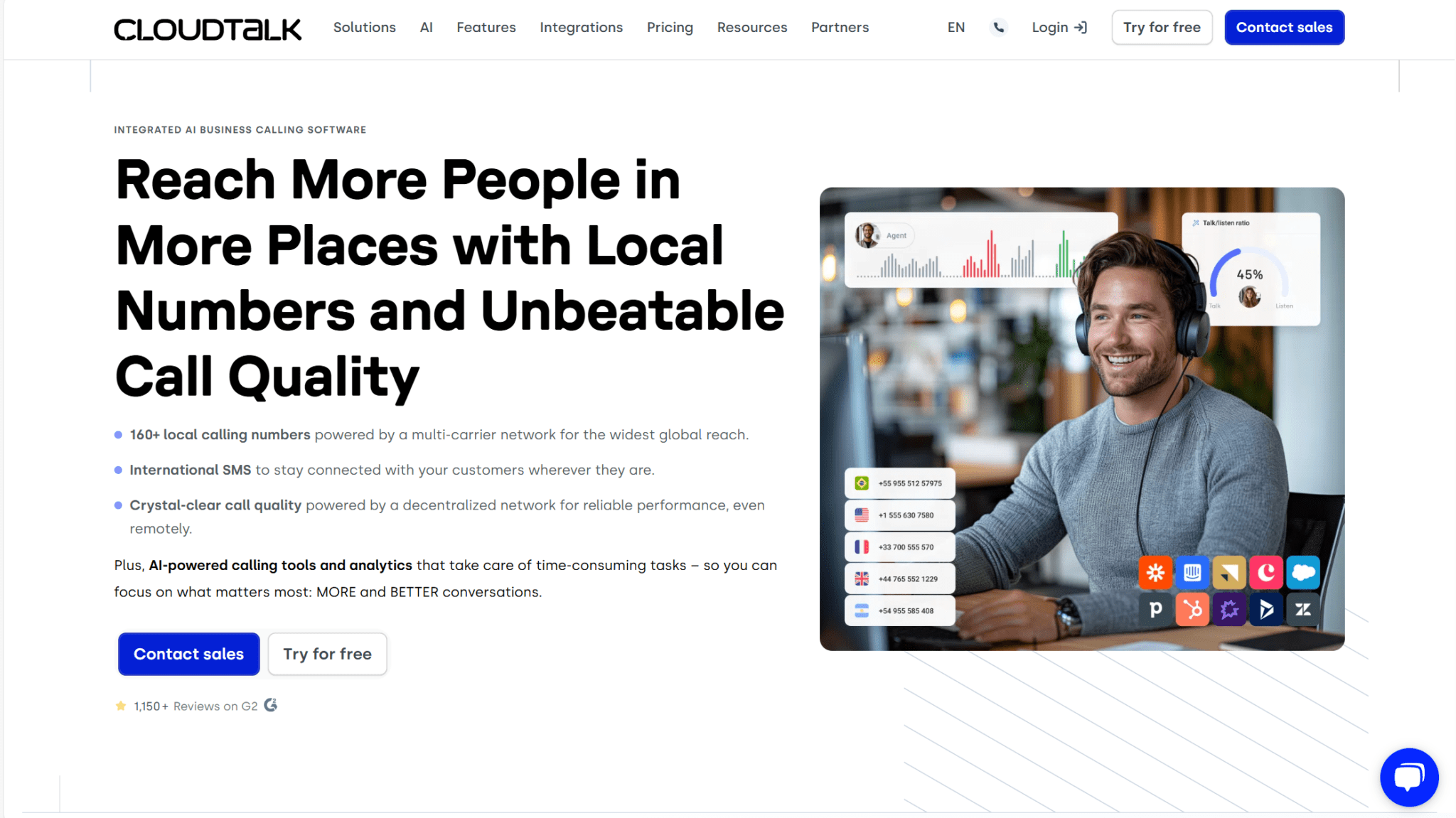
Cloudtalk is a cloud-based business phone system designed for sales and customer support teams. It offers VoIP calling, call routing, interactive voice response (IVR), and real-time analytics, all accessible through an easy-to-use interface.
Cloudtalk claims to help your sales team reach more people in more places with local numbers and high-end call quality. It integrates with popular CRM systems and helpdesk platforms like Salesforce, HubSpot, and Zendesk, making it a solid choice for teams that rely on phone conversations to drive results.
While it’s a reliable tool for many businesses, Cloudtalk isn’t a one-size-fits-all solution. Some users find it lacking in advanced AI features, multichannel support, or pricing flexibility, leading them to explore alternative platforms better suited to their specific needs.
What Are Users Saying About Cloudtalk?
Cloudtalk is generally well liked by the majority of users, but it fails to score highly on average across any of the review platforms we looked into. When you look at the reviews as a whole, it becomes clear why some users are searching for Cloudtalk alternatives. Let’s break down what people are saying about Cloudtalk:
- What are G2 Reviewers Saying About Cloudtalk?
- What are Capterra Reviewers Saying About Cloudtalk?
- What are TrustPilot Reviewers Saying About Cloudtalk?
What are G2 Reviewers Saying About Cloudtalk?
Cloudtalk scores a solid 4.4/5 on G2, from over 1,000 reviews. Most users compliment the platform’s ease of use, reliability, and great customer service (though they are only reachable if you’re on the highest tier).
However, some of the negative reviews comment on the issues they’ve encountered using the tool. For instance, Aleksander, a CEO of a small business, said it’s “good when it works, [but a] complete disaster when there is a problem.” His company was unable to call any number from an entire country for over a week and there was seemingly no fix available.
Another user said there were “long pauses before calls connected, if they did connect [at all].” This user claims that it might be more affordable than some alternatives, but that it will eat up more of your time. They also signed up to the monthly subscription and were immediately billed annual pricing.
What are Capterra Reviewers Saying About Cloudtalk?
On Capterra, Cloudtalk also scores 4.4/5, making it consistent across different review platforms. While some customers claim it’s user-friendly, has great overseas call quality, and quick and easy to set up, others highlight that you have to be by your computer at all times. This is terrible for small teams that are constantly on the go.
Similarly, some users pointed out the clunky user interface. The call window is unable to be resized and the disconnect option is hidden under the system taskbar, making it awkward to access.
Another user says that “Cloudtalk is a young system that promises more than it can deliver.” They go on to claim that the marketing team is “propping up a half-built software system” and that their average support chat response time is 2-4 hours, as opposed to the 5 minutes they claim.
What are TrustPilot Reviewers Saying About Cloudtalk?
On TrustPilot, Cloudtalk scores 4.2/5, marking it as the lowest ranked of the three. Again, many customers claim that the customer service is impossible to reach via the phone unless you pay extra for the highest subscription plan. Yet, the online chat is not good enough to solve the problems users commonly have.
More than a few one-star reviews point to the company making it difficult to cancel your contract, while others claim Cloudtalk misses the mark even on basic features like calling. Middle-of-the-road 3/5 star reviews weigh the pros and cons: they say the product is great but the customer service could be improved upon.
There are also people suggesting the free trial is misleading and confusing for the customer. There’s no option to upgrade without contacting the sales team, and there is no clear message about the expiry of features.
So, Is Cloudtalk Worth the Money?
After assessing the various Cloudtalk reviews, it’s definitely not a terrible choice. 4.4/5 isn’t a bad score, however, there are a variety of Cloudtalk alternatives that do the same thing but better. Sometimes, cheaper too.
How Much Does Cloudtalk Cost?
CloudTalk offers four main pricing tiers designed to accommodate businesses of varying sizes and needs:
Starter: Starting at $25 per user/month (billed annually), this plan includes unlimited inbound and intracompany calls, 500 outbound minutes for select regions, call recording, and access to international numbers in over 160 countries.
Essential: Priced at $30 per user/month (billed annually), it builds upon the Starter plan by offering 1,000 outbound minutes for select regions, unlimited call queuing, and additional features like call tagging and advanced analytics.
Expert: At $50 per user/month (billed annually), this tier adds advanced functionalities such as smart dialers, live call monitoring, Salesforce integrations, and 24/7 phone support.
Custom: Tailored for enterprises with specific requirements, this plan offers unlimited worldwide calling packages, custom onboarding, priority support, and enterprise-level security features. Pricing is available upon request.
Additionally, CloudTalk offers an AI Conversation Intelligence add-on for $9 per user/month, providing features like call transcription, sentiment analysis, and automatic summaries.
Why You Might Be Looking for a Cloudtalk Alternative
CloudTalk is a strong VoIP tool for support and sales teams, but it’s not the perfect fit for every workflow. As your business grows or your tech stack evolves, you might find yourself needing features or flexibility that CloudTalk just doesn’t offer. Here are some of the most common reasons teams start looking for alternatives:
- Better value at scale
- More advanced AI or analytics
- Deeper CRM integrations
- Multichannel capabilities (video, SMS, prospecting)
- A cleaner, more intuitive interface
Better value at scale
CloudTalk’s pricing can get steep as your team expands, especially if you’re looking to scale across multiple regions or departments. Some Cloudtalk alternatives offer more generous calling limits, lower per-user costs, or bundled features that reduce the need for extra tools.
More advanced AI or analytics
While CloudTalk has solid reporting, it doesn’t go as deep as some of the newer players in the space. Teams looking for AI-driven insights, real-time coaching, call summaries, or sentiment analysis may want to consider tools with more cutting-edge capabilities.
Deeper CRM integrations
Integrations with CRMs like Salesforce, HubSpot, or Pipedrive exist, but they may feel limited in automation or customization. If you’re heavily reliant on CRM workflows, tighter integration with lead tracking, call logging, or sales automation could save hours of manual work. Studies show that 32% of sales reps spend more than one hour per day on manual data entry. That compounds fast. But it’s not necessary in the modern age, especially not with AI agents for meetings.
Multichannel capabilities (video, SMS, prospecting)
CloudTalk is primarily a voice solution. If your team needs a tool that combines calling with video conferencing, SMS campaigns, or even outbound email prospecting, there are platforms designed to do it all—without switching tabs.
A cleaner, more intuitive interface
Usability matters. Some users find CloudTalk’s dashboard a bit clunky or dated compared to more modern competitors. Whether it’s onboarding new reps or streamlining daily workflows, a clean and intuitive UI can make a huge difference in team adoption.
What to Look for in a CloudTalk Alternative
Not all communication platforms are created equal, especially when your team’s efficiency and customer experience are on the line. Whether you’re a sales manager, support lead, or ops director, here’s what to prioritize when exploring CloudTalk alternatives:
- AI transcription and call insights
- Omnichannel support
- CRM and helpdesk integrations
- Global number support
- Coaching and performance analytics
- Ease of use and fast setup
AI Transcription & Call Insights
Modern teams need more than just recordings—they need instant transcripts, call summaries, and smart coaching tools. Look for platforms that reveal insights automatically so reps can focus on closing, not note-taking.
Omnichannel Support
Your customers and prospects don’t just use phones. The best alternatives support voice, SMS, video, and even email or chat, all from a single interface. This helps you create consistent, cross-channel conversations without platform-hopping.
CRM & Helpdesk Integrations
If your team lives in Salesforce, HubSpot, Pipedrive, or Zendesk, make sure the alternative integrates deeply. This isn’t just for call logging, but for triggering workflows, auto-enriching contacts, and syncing insights in real time. Deep CRM integrations take your automation game to the next level.
Global Number Support
Expanding into new markets? You’ll need local and toll-free numbers across countries, in-region compliance, and reliable call quality worldwide. A good Cloudtalk alternative should make international scaling frictionless.
Coaching & Performance Analytics
Beyond basic reporting, look for tools that offer rep-level dashboards, live coaching, whisper/barge features, and performance trend tracking. These features are gold for revenue teams looking to sharpen skills and boost results. They can be a real boost for overall sales team performance, let alone self-coaching.
Ease of Use & Fast Setup
Let’s face it: no one wants a six-week onboarding. The best tools are intuitive from day one, with plug-and-play integrations, self-service dashboards, and onboarding support that gets your team up and running in hours, not days.
The Best 5 Alternatives to Cloudtalk for 2025 and Beyond
There are hundreds of Cloudtalk alternatives on the market, but you don’t have to browse through all of them. We’ve already gathered the top 5 and bundled them into a single review so you can quickly and easily find a Cloudtalk replacement that’s good for your organization.
We’ll cover:
- tl;dv – best for AI-powered meeting insights
- Dialpad – best for unified AI communications
- Aircall – best for call centers and sales teams
- JustCall – best for international numbers and SMS
- RingCentral – best for all-in-one business communications
1. tl;dv – Best for AI-Powered Meeting Insights
Why switch: Perfect for remote and async teams who want AI notes, searchable transcripts, and CRM sync from Zoom, Google Meet, and MS Teams calls
When considering alternatives to Cloudtalk, tl;dv offers a compelling case as a modern, AI-powered meeting assistant that does more than just facilitate calls. While Cloudtalk functions primarily as a VoIP platform focused on outbound calling and call center operations, tl;dv excels in transforming your conversations—across Zoom, MS Teams, and Google Meet—into rich, actionable data that fuels both sales and operational efficiency.
Its value lies not in being a dialer, but in what happens after the call. tl;dv actually integrates with a number of dialers to provide unlimited recording, transcription, and AI-generated summaries that turn every conversation into an opportunity for insight and improvement.
One of tl;dv’s standout features is its multi-meeting intelligence. Sales and customer success teams can aggregate insights across dozens of calls and have tl;dv’s AI identify recurring patterns, such as common objections, competitor mentions, or customer pain points, with pinpoint accuracy and timestamped context. It’s like having a sales coach and data analyst embedded in every meeting, delivering regular reports straight to your inbox.
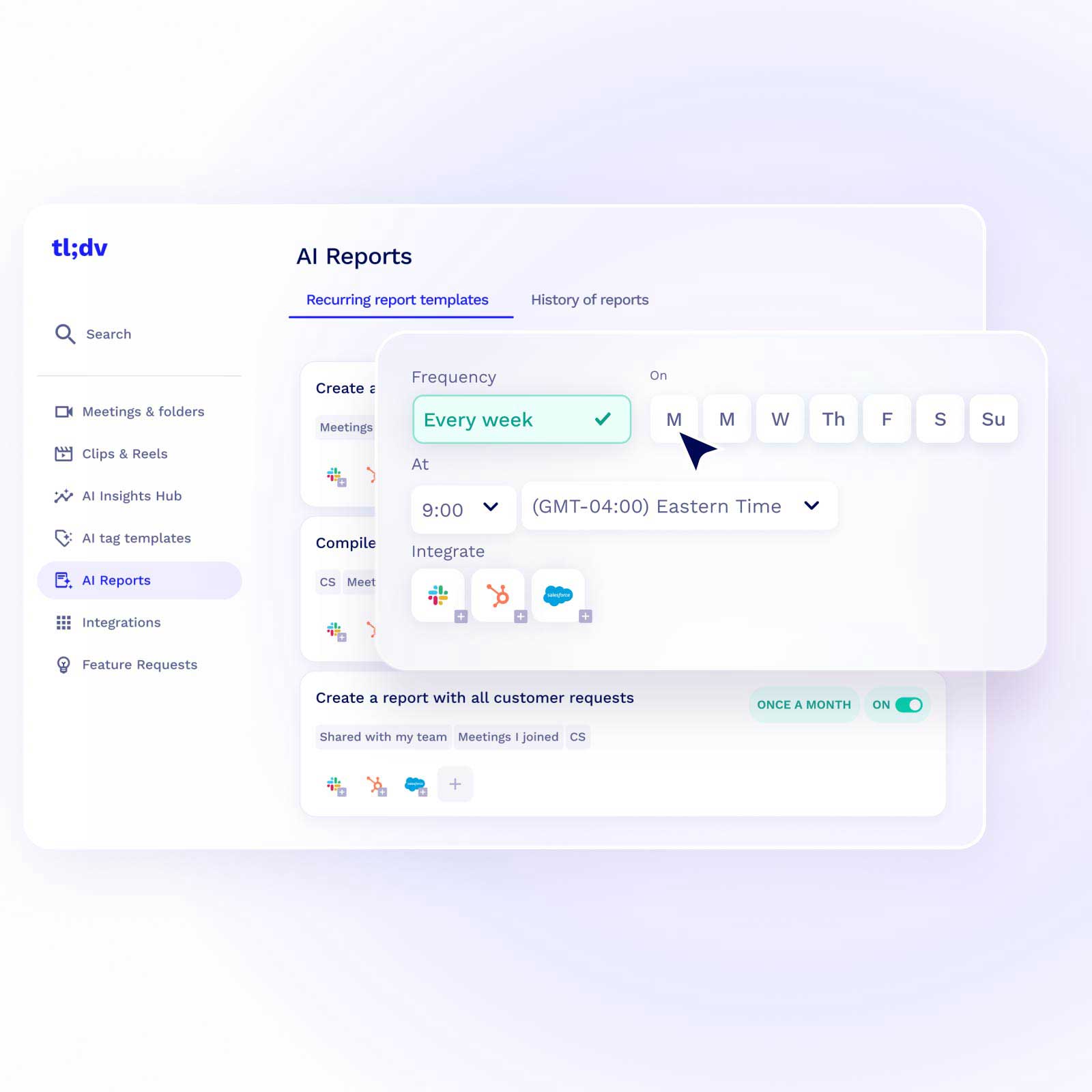
What sets tl;dv apart further is its flexibility and accessibility. It operates across various departments (from HR to product, from CS to sales), and its pricing model reflects that versatility. The free plan alone includes unlimited recordings, transcriptions, and AI summaries, making it an accessible entry point for teams of any size. Meanwhile, its CRM integrations, customizable templates, and AI-generated objection handling tips give sales reps the tools to close more deals with less friction, all without requiring them to spend time on manual data entry or call reviews.
For globally distributed or remote-first teams, tl;dv is especially well-suited. With a platform localized in seven languages and transcription support in over 40, it’s built to support international collaboration without barriers. Add in integrations with 5,000+ tools and you’ve got a solution that not only replaces some of Cloudtalk’s functionality but expands upon it in smarter, more adaptable ways.
What Are tl;dv’s Best Features? (Pros)
- Free AI Integration: tl;dv leverages first class AI to provide summaries, notes, and automatic speaker detection.
- Free and Instant Translations: tl;dv’s transcriptions are available in more than 40 languages for Zoom, MS Teams, and Google Meet. It also has a localized platform in 7 languages, making it an excellent choice for multinational teams.
- Incredible Free Plan: Unlimited free video recordings and transcriptions of Zoom, MS Teams, and Google Meet calls.
- Easy to Use: tl;dv’s sleek design makes it super easy for beginners and experts alike.
- Multi-Meeting Intelligence. Schedule recurring reports to get insights from multiple meetings at once, delivered straight to your inbox.
- Sales Coaching. Upgrade your sales team using insights from your sales calls. Improve objection handling and use templates or custom playbooks to personalize your coaching strategy.
- Timestamps and Tagging Features: Timestamp your meeting highlights to quickly jump back to specific moments in the call. It also features the ability to tag colleagues at specific meeting moments so they get an email with a link straight to their inbox.
- 5,000+ Integrations: Push timestamps and meeting clips directly to Notion, Slack, HubSpot, Salesforce, and 5,000+ more.
- Custom Meeting Templates. Create and edit meeting templates so that the AI takes notes exactly how you want it to. Sync these directly with your CRM of choice by creating a template with the CRM fields you wish to fill.
- Create Clips and Highlights: Scan your library and make clips and highlight reels to condense insights.
- Intuitive Library: Search your meetings library for keywords in transcripts to quickly find what you’re looking for.
- Concurrent Meetings. tl;dv’s AI can record and transcribe multiple meetings at the same time, making your life easier if you’re double (or triple+) booked.
What Are tl;dv’s Biggest Drawbacks? (Cons)
- Compatibility: Not yet available for Webex or GoToMeeting.
- No Revenue Intelligence. While tl;dv provides ample sales coaching features, it doesn’t have any revenue intelligence features yet.
- Limited Dialing Features. tl;dv is built more for warm sales calls than cold calling. It doesn’t offer power dialing, business numbers, or autodialing features, but it does have direct integrations with powerful dialers like Aircall.
How Much Does tl;dv Cost?
tl;dv has a top free plan that provides you with unlimited call recordings, transcripts, and AI summaries. It includes lots of other limited AI features too. However, to maximize your sales team’s efficiency, you’ll need to opt for one of the paid plans.
The Pro plan costs $18 per user per month. This unlocks 5,000 integrations, unlimited “Ask tl;dv” prompts, and unlimited multi-meeting reports, among other things.
The Business plan will set you back $39 per user per month and unlocks sales playbook monitoring and AI coaching, AI objection handling tips, and multi-meeting speaker insights.
Depending on which region of the world you’re in, you can get up to a 40% discount on tl;dv’s paid plans!
What’s Included in tl;dv’s Free Plan?
- Unlimited video recordings and transcripts.
- Record Google Meet, Zoom, and MS Teams calls.
- Transcribe in 40+ languages
- Unlimited AI moment summaries
- 10x AI Meeting Notes
- 10x Ask tl;dv AI
- 10x AI Multi-Meeting Reports
- Slack, Email, and Calendar integrations
- Set timestamps and highlights
- Create and share clips
- Automatic speaker recognition
- 3 monthly uploads
For the full details of all of tl;dv’s plans, see here.
tl;dv vs Cloudtalk: Which Platform is Best for You?
While Cloudtalk is primarily known as a VoIP dialer and call center solution, tl;dv takes a different yet complementary approach by focusing on what happens after the call. tl;dv isn’t a dialer itself, but it excels in post-call workflows, automations, and deep conversational analysis.
For teams already using a dialer like Cloudtalk, tl;dv offers a powerful layer of intelligence that can transform raw conversations into actionable insights—automatically generating summaries, tagging key moments, highlighting objections, and syncing notes directly into your CRM.
What makes tl;dv especially valuable is its ability to integrate with existing dialer tools such as Aircall. So if your team needs a dedicated dialer, you don’t have to choose one over the other. You can keep using Cloudtalk for outbound calling, while letting tl;dv take care of the post-call magic: analyzing conversations at scale, spotting trends across multiple meetings, and delivering tailored coaching insights or competitor intel straight to your inbox. It’s an ideal setup for teams that want to sharpen their sales edge without overhauling their entire tech stack.
2. Dialpad – Best for Unified AI Communications
Why switch: Combines voice, video, messaging, and AI transcription into one sleek interface.
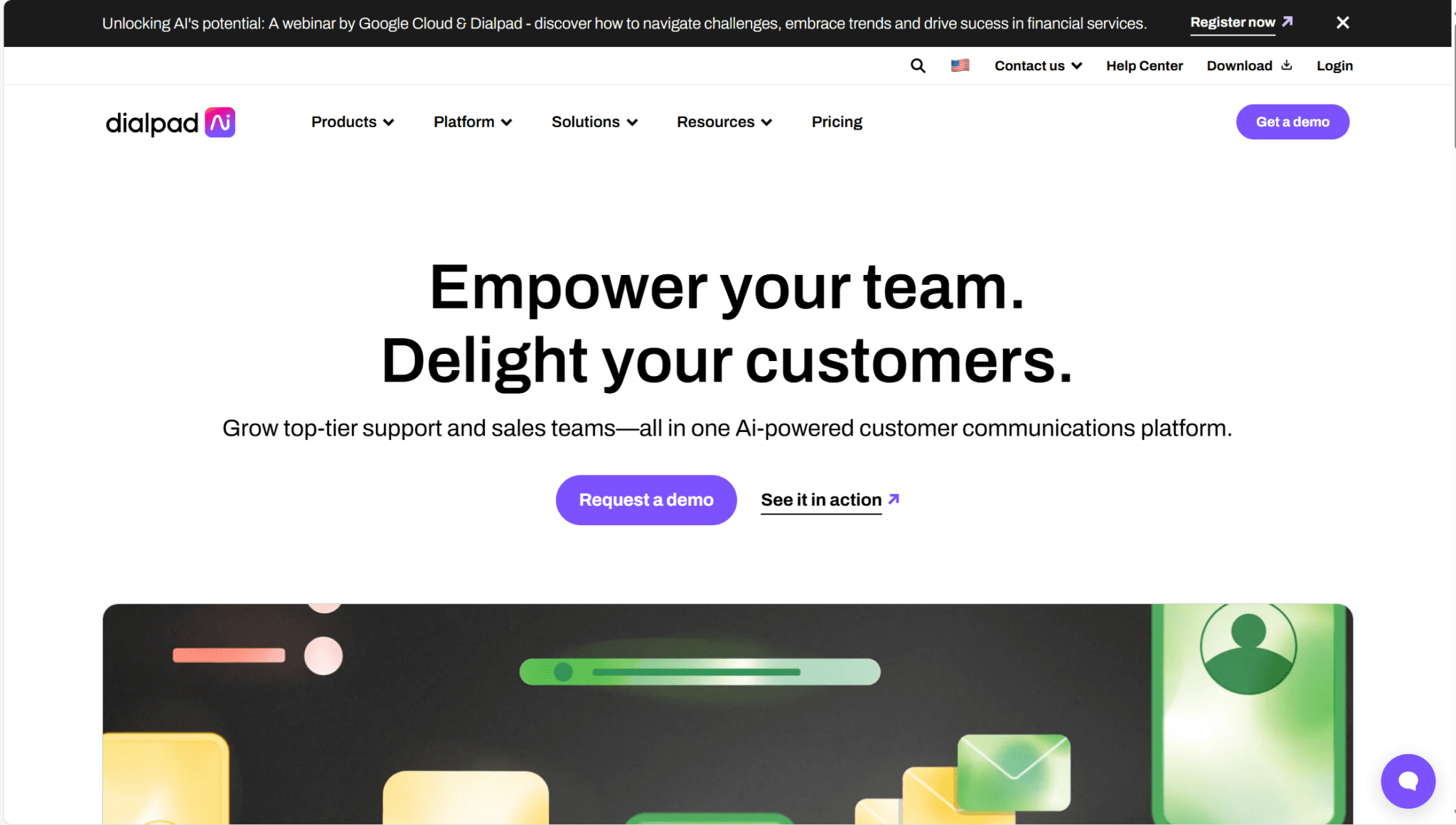
If you’re exploring alternatives to Cloudtalk and want something more than just a dialer, Dialpad makes a strong case. It’s a true unified communications platform, combining voice, video, messaging, and contact center functionality under one AI-powered roof. While Cloudtalk excels as a focused VoIP and call center solution, Dialpad goes further by offering real-time transcription, AI coaching, and even post-call summaries—all natively within the platform.
What sets Dialpad apart is its AI at every stage of the conversation, not just after. During live calls, reps get real-time assistance, like objection handling prompts and sentiment alerts, so they can pivot fast. Post-call, Dialpad automatically generates searchable transcripts, action items, and insights, helping sales and support teams iterate quickly and stay aligned.
Dialpad also doubles as a full business phone system, offering local numbers, SMS, and integrations with popular CRMs like HubSpot and Salesforce. For teams looking to consolidate tools, Dialpad might replace Cloudtalk entirely, especially if you need both calling and messaging in one place, along with live and post-call AI support.
What Are Dialpad’s Best Features? (Pros)
- Real-Time AI Coaching: Dialpad’s AI listens in and provides live suggestions, objection handling, and real-time transcription during calls.
- All-in-One Comms Suite: Combines VoIP calling, SMS, video meetings, and team messaging in one unified platform.
- Post-Call Summaries: AI automatically generates summaries and action items after meetings or sales calls.
- CRM Integrations: Natively integrates with Salesforce, HubSpot, Zendesk, and more.
- Cross-Platform Availability: Use it on desktop, browser, or mobile.
- Global Reach: Includes international phone numbers and calling in over 70 countries.
What Are Dialpad’s Biggest Drawbacks? (Cons)
- Learning Curve: With so many features, it can feel overwhelming at first for smaller teams.
- Less Customizable Post-Call Automation: Unlike tl;dv, it doesn’t offer templated coaching playbooks or advanced multi-meeting analytics.
- Pricey for Small Teams: While powerful, costs can climb quickly if you need advanced AI or contact center features.
How Much Does Dialpad Cost?
Dialpad’s pricing structure is divided across four core products: Connect, Meetings, Support, and Sell. Each one has its own tiered plan. This can get a bit confusing, but here’s a high-level breakdown:
Dialpad Connect (business communication) starts at $15/user/month and goes up to custom enterprise pricing. It includes unlimited calling, voicemail transcription, AI meetings, and CRM integrations at higher tiers.
Dialpad Meetings (video conferencing) offers a free plan with limited call duration and participants, while the Business plan at $15/user/month adds AI transcriptions, summaries, and larger meeting capacity.
Dialpad Support (contact center) starts at $80/user/month and includes advanced features like IVR, ACD, call and screen recording, transcriptions, and AI coaching tools.
Dialpad Sell (sales dialer) begins at $39/user/month and provides power dialing, AI moments, coaching features, integrations, and sales playbooks.
While the features often overlap, they’re packaged differently depending on the product, making it tricky to compare. Thankfully, Dialpad offers 14-day free trials across most plans, so you can test what fits best before committing.
What’s Included in Dialpad’s Free Plan?
Dialpad doesn’t currently offer a comprehensive free plan for its business phone or contact center tools. However, there’s a free plan for Dialpad Meetings, which includes:
- 45-minute video meetings
- Unlimited conferencing
- Screen sharing
- AI-powered transcriptions (limited)
Dialpad vs Cloudtalk: Which Platform Is Best for You?
Cloudtalk is a specialist in outbound calling and call center management, ideal for teams focused heavily on high-volume sales and support operations. Dialpad, on the other hand, is built for end-to-end communication, making it better suited for companies that want a single tool for calling, messaging, and video, all with built-in AI.
If your team values real-time AI support during calls, unified communications, and fewer tools in the stack, Dialpad could be the smarter investment. But for high-velocity sales teams that live on the phone and want a laser-focused dialer, Cloudtalk might still come out on top.
3. Aircall – Best for Call Centers & Sales Teams
Why switch: Built from the ground up for support and outbound sales, with powerful team features.
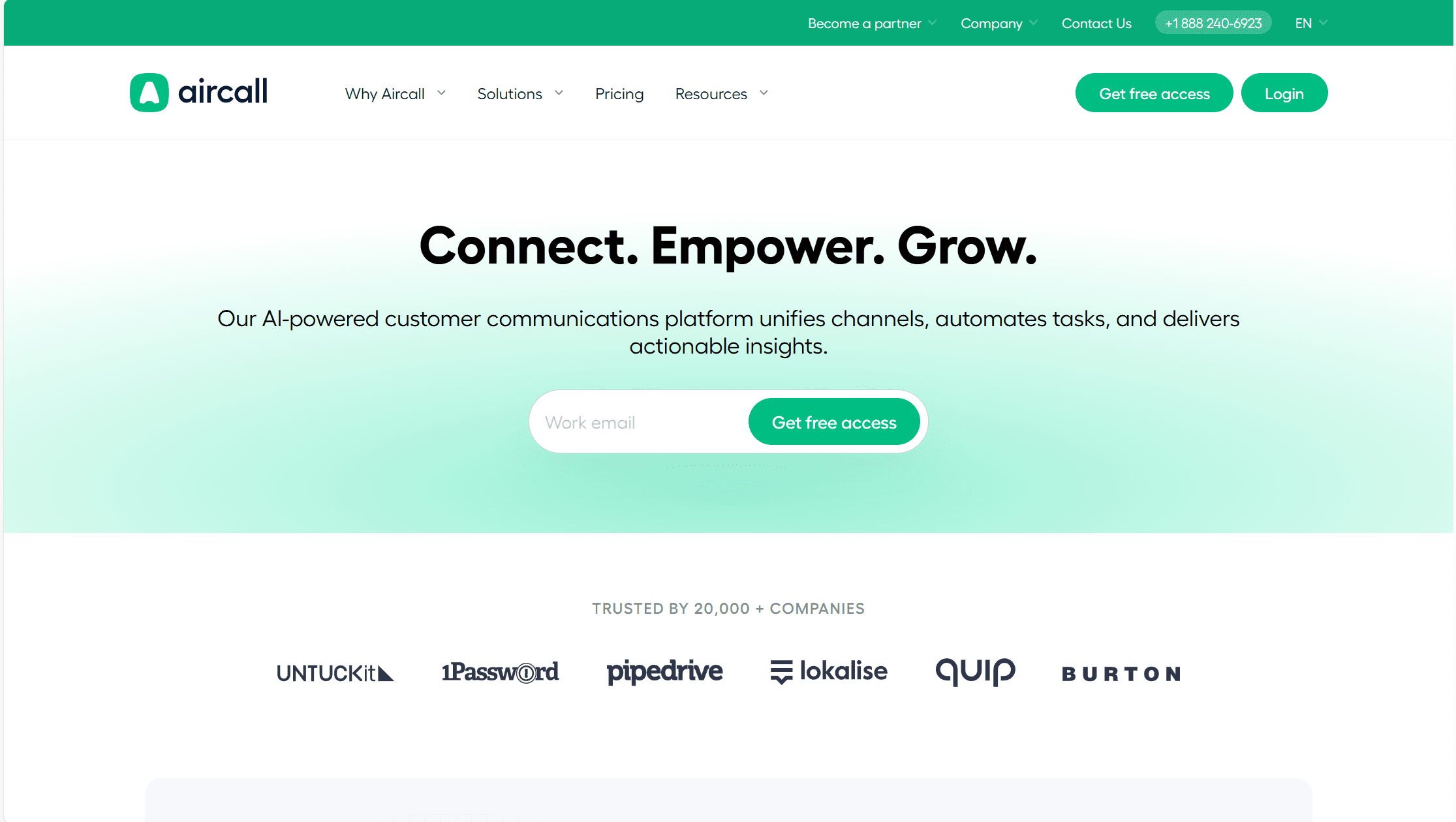
Aircall is a cloud-based phone system built for growing sales and support teams. While Cloudtalk offers similar VoIP functionality, Aircall stands out for its intuitive setup, deep CRM integrations, and a highly efficient Power Dialer. It’s especially well-suited to teams that live in HubSpot, Salesforce, or Pipedrive and want a seamless workflow between calling and pipeline management.
Aircall isn’t just a dialer—it’s a flexible voice solution designed to help reps spend less time clicking and more time connecting. You can create local numbers in over 100 countries, route calls smartly with IVR, and monitor performance live. Its call coaching tools (whisper, monitor, barge) make it easy to onboard and support reps without interrupting the customer experience.
With 100+ integrations and an open API, Aircall plugs into your existing stack effortlessly. Whether you’re scaling fast, managing distributed teams, or just want a more polished inbound/outbound voice system, Aircall delivers enterprise-grade functionality without enterprise headaches.
What Are Aircall’s Best Features? (Pros)
- Power Dialer: Automates call lists and integrates directly with your CRM to speed up outbound efforts.
- Live Coaching: Call whispering, live monitoring, and barging let managers support reps in real time.
- 100+ Integrations: Works out of the box with Salesforce, HubSpot, Zendesk, Pipedrive, and more.
- Global Numbers: Instantly create local and international numbers in over 100 countries.
- Smart Call Routing: IVR and call queues to manage high call volumes and direct inquiries to the right reps.
Real-Time Analytics: Custom dashboards to track agent activity, call outcomes, and KPIs.
What Are Aircall’s Biggest Drawbacks? (Cons)
- No AI Meeting Summaries: Doesn’t provide automated call transcription or summaries like tl;dv.
- Cost Can Scale Quickly: For large teams or multiple integrations, pricing can get steep.
- Limited Non-Voice Features: No video calling, email, or SMS automation built-in. It’s strictly voice-focused.
How Much Does Aircall Cost?
Aircall’s pricing starts at $30 per user/month (Essentials) and goes up to $50 per user/month (Professional), with custom pricing available for Enterprise. The higher tiers unlock advanced analytics, call monitoring, and more integration options.
They don’t have a permanent free plan, but a 7-day free trial is available with full feature access to test it out.
Aircall vs Cloudtalk: Which Platform is Best for You?
Both Aircall and Cloudtalk offer strong VoIP capabilities, but Aircall wins on usability, integrations, and live coaching. If your team needs a quick-to-deploy system with deep CRM sync and efficient outbound tools, Aircall is the better pick. It’s purpose-built for sales and support workflows, with tools to help managers coach in real time and reps focus on calls that convert. On the other hand, if pricing flexibility or more contact center-specific features are a higher priority, Cloudtalk may be a better fit.
If you’re already using tools like tl;dv for post-call analysis, Aircall pairs beautifully, giving you a top class dialer for the call itself, and letting tl;dv handle everything after.
4. JustCall – Best for International Numbers & SMS
Why switch: Great if you need numbers in 70+ countries and integrated SMS for outreach.
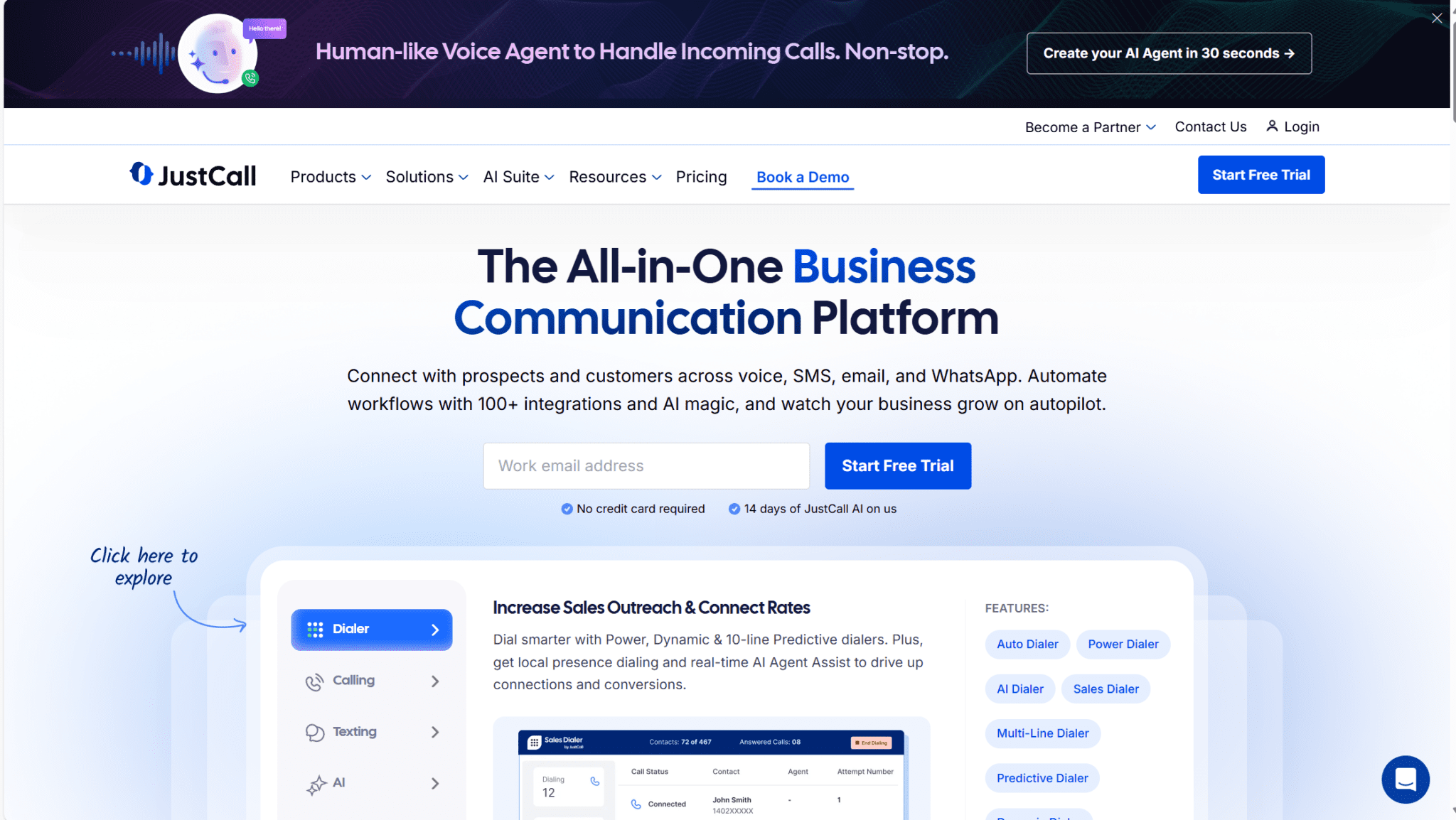
Built specifically for sales and support teams, JustCall combines the essentials of a VoIP platform with automation, AI coaching, and multi-channel communication to streamline outbound and inbound workflows. It dubs itself as the all-in-one business communication platform.
Unlike Cloudtalk, which focuses heavily on call center functions, JustCall extends its utility across sales, support, and success with features like smart dialers, call monitoring, and SMS workflows. It’s especially great for outbound-focused teams who rely on cold calls, bulk texting, and auto-dialing to scale their efforts. Plus, JustCall’s AI Sales Coach adds an extra edge, analyzing conversations and providing reps with real-time tips, scorecards, and coaching insights.
The platform shines in its simplicity and CRM-centric approach. With one-click integrations for over 100+ CRMs (including HubSpot, Salesforce, and Pipedrive), JustCall ensures your team spends less time logging calls and more time closing deals. If you’re looking for a Cloudtalk replacement that delivers a more comprehensive sales toolset, JustCall is a strong contender.
What Are JustCall’s Best Features? (Pros)
- Smart Dialers: Power, predictive, and auto dialers for high-volume outbound calling.
- Text Messaging: SMS & MMS automation workflows, bulk messaging, and texting from your business number.
- AI Sales Coach: Real-time feedback, sentiment analysis, and personalized coaching for reps.
- CRM Integrations: Deep integrations with 100+ CRMs like Salesforce, HubSpot, Zoho, and more.
- Call Monitoring & Whispering: Managers can monitor live calls, whisper tips to agents, or barge in.
- Shared Inbox: Centralized communication for phone, SMS, WhatsApp, and emails in one view.
- IVR & Call Routing: Set up smart IVRs, round-robin routing, and time-based call flows.
- Mobile + Desktop Apps: Fully-featured apps for both iOS and Android.
What Are JustCall’s Drawbacks? (Cons)
- Interface Can Be Cluttered: Some users report a steeper learning curve compared to simpler dialers.
- Limited Post-Call AI Analytics: While great for real-time coaching, it lacks some of the AI-based post-call insights that tools like tl;dv offer.
- SMS Pricing Varies: Messaging costs are usage-based, and international texting can get pricey.
How Much Does JustCall Cost?
JustCall pricing starts at $29 per user/month for the Essentials plan, which includes the basic dialer, call forwarding, SMS, integrations, and IVR. The Pro plan costs $49/user/month and unlocks the power dialer, queue callback, and intelligent call routing.
For AI sales coaching, advanced reporting, call scoring, and automation workflows, you’ll need the Pro Plus plan at $89/user/month. The Business plan offers more granular control, multi-level analytics, and enterprise support and pricing is available upon request.
JustCall does not offer a free plan, but it does provide a 14-day free trial with access to most core features including the dialer, texting, integrations, and team collaboration tools.
JustCall vs Cloudtalk: Which One’s Best?
Cloudtalk and JustCall both offer VoIP functionality, but JustCall pulls ahead for sales and support teams that rely on multi-channel outreach. With advanced dialers, SMS workflows, and AI coaching built-in, JustCall turns your call center into a revenue-driving engine.
If you’re mainly running inbound support or need detailed call center analytics, Cloudtalk may still fit the bill. But if your team lives in the world of cold calls, warm follow-ups, and texting prospects on the fly, JustCall offers a faster, smarter, and more integrated experience, especially when CRM integration and automation are top priorities.
5. RingCentral – Best All-in-One Business Communications
Why switch: For businesses needing voice + video + messaging in one platform.

Unlike Cloudtalk, which is primarily a VoIP-focused outbound calling tool, RingCentral offers a full Unified Communications as a Service (UCaaS) suite, making it a better fit for larger, hybrid, or enterprise-level teams who need voice, video, SMS, and team messaging in one place. It’s especially strong in internal collaboration, with native messaging and team workspace features that eliminate the need for extra tools like Slack or Zoom.
From a call center perspective, RingCentral’s Contact Center product includes advanced features like IVR, omnichannel routing (voice, chat, email, and social), workforce management, and analytics dashboards. For sales teams or support agents who want real-time performance tracking, seamless CRM integration, and automatic call logging, RingCentral delivers a comprehensive, enterprise-ready environment.
While it may be overkill for smaller startups or teams that only need basic outbound calling, RingCentral shines when scalability, reliability, and cross-channel engagement matter most. Its rock-solid 99.999% uptime guarantee and worldwide infrastructure make RingCentral a dependable option for companies with a global presence.
What Are RingCentral’s Best Features? (Pros)
- All-in-One Communication: Combines phone, video, SMS, fax, and team chat in one app.
- Enterprise-Grade Call Center Tools: Includes IVR, smart routing, call queuing, analytics, and workforce optimization.
- Omnichannel Support: Manage customer conversations across voice, chat, SMS, and social platforms.
- CRM Integrations: Native support for Salesforce, HubSpot, Zendesk, and more.
- Global Reliability: 99.999% uptime SLA with local numbers in over 100 countries.
- Built-in Team Messaging: Streamline internal communication without external tools.
- AI-Powered Analytics: Real-time dashboards and post-call summaries with AI assistance.
What Are RingCentral’s Biggest Drawbacks? (Cons)
- More Expensive: Pricing can get steep compared to Cloudtalk, especially at scale.
- Overwhelming for Small Teams: May be too feature-heavy for teams with simple VoIP needs.
- Less Customizable Dialer Experience: Doesn’t offer the same lean dialer-first focus as Cloudtalk.
How Much Does RingCentral Cost?
RingCentral has a confusing pricing system with several pricing tiers, starting at $30/user/month (Core plan) and going up to $65+/user/month for more advanced features.
The Contact Center plan is sold separately and requires a custom quote. Prices vary based on business size, region, and features required.
What’s Included in RingCentral’s Free Plan?
There’s no free plan for RingCentral’s business communications suite. However, they do offer free trials for certain plans and occasionally for limited-time promotions. You’ll need a paid plan for full access to call routing, analytics, and integrations.
They do, however, offer a free plan for the Video Pro plan. This unlocks:
- Unlimited 50 minute video meetings for up to 100 participants
- Whiteboard, content sharing, and annotations
- AI-powered meeting insights and transcriptions
- Collaborative notes
- Full-featured mobile and browser experience
RingCentral vs Cloudtalk: Which Platform Is Best for You?
If you need a lightweight, outbound-focused dialer, Cloudtalk remains a strong pick. But if your team wants a centralized communication hub that handles voice, video, chat, and contact center operations with enterprise reliability, RingCentral wins on scale, features, and flexibility.
For hybrid teams or global customer support centers, RingCentral brings serious firepower, replacing multiple tools with a single ecosystem. You can even pair RingCentral with tools like tl;dv for deeper meeting intelligence, making it part of a broader, smarter tech stack.
The Verdict: Which Cloudtalk Alternative is Best for Your Business?
The best Cloudtalk alternative depends on your team’s priorities. If you want to turn meetings into insights, tl;dv is unmatched with its AI summaries, multi-meeting reports, and CRM sync. It’s ideal for remote teams and deep post-call analysis. For all-in-one communication powered by AI, Dialpad is a strong contender with voice intelligence baked into calls, video, and messaging.
If outbound calling is your focus, Aircall and JustCall are both great choices. Aircall offers deep CRM integrations and analytics for scaling sales teams, while JustCall brings affordable automation and ease of use to startups. For large, global teams, RingCentral delivers enterprise-grade reliability and full-suite communications on a trusted, high-uptime network.
Each platform brings something different to the table. Choose based on whether you need smarter insights, better dialing, or unified communications at scale.
FAQs About Cloudtalk and Its Alternatives
What is Cloudtalk?
Cloudtalk is a cloud-based call center software designed for sales and customer service teams. It offers VoIP calling, call routing, analytics, CRM integrations, and automation tools to help businesses manage inbound and outbound calls efficiently.
What are the top alternatives to Cloudtalk?
Some of the best alternatives include:
Dialpad – Great for all-in-one communication with built-in AI voice intelligence.
tl;dv – Best for turning video meetings into insights with automatic summaries and CRM syncing.
Aircall – Focused on sales teams needing deep CRM integration and analytics.
JustCall – A budget-friendly choice for startups with automation and simple onboarding.
RingCentral – Suited for enterprise teams needing a global communication suite.
How does Cloudtalk compare to Dialpad?
While both offer VoIP calling and CRM integration:
Cloudtalk focuses more on call center features like skill-based routing and IVR.
Dialpad offers broader team communication tools including messaging and meetings, all powered by AI.
Is Cloudtalk good for outbound sales?
Yes. Cloudtalk has tools like power dialing, call tagging, analytics, and integrations with CRMs, making it great for sales outreach. However, Aircall and JustCall may offer more tailored outbound features at different price points.
Which Cloudtalk alternative is best for remote teams?
tl;dv is excellent for remote teams needing actionable insights from video calls. Dialpad is also a strong option due to its unified communication platform and remote-friendly features.

